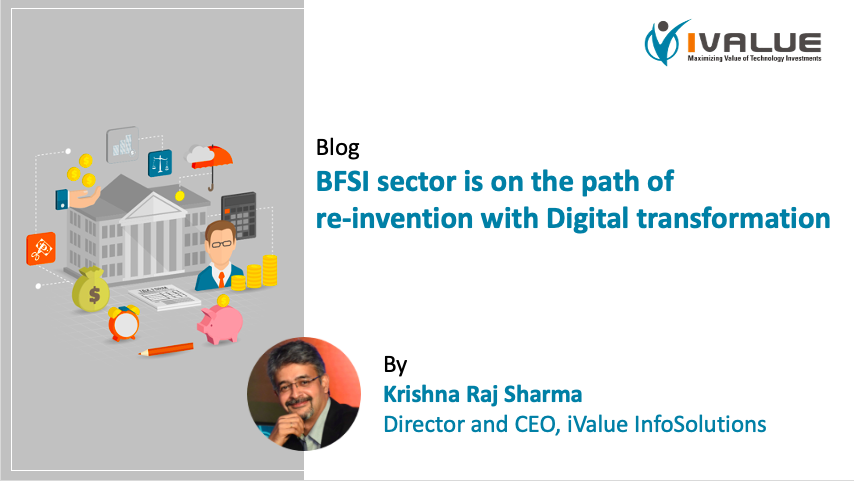BFSI sector is on the path of re-invention with Digital transformation - Krishna Raj Sharma, Director and CEO, iValue InfoSolutions

Digital transformation is driving a profound transformation to the structure of all industries today with the Banking and Financial Services sector too undergoing radical shift. Thanks to Covid-19, the future of the BFSI industry arrived before its time with the need to adapt to the digital landscape so as to stay ahead of the sector’s growth curve. Innovation in the fintech sector is bringing many more services as compared to the existing ones for the convenience of the new-age customer. This digital-savvy customer demands a seamless, integrated, omnichannel banking experience, with related security issues addressed promptly. Going digital and embracing the change is the only way to future-proof banks and financial institutions.
Creating a digital transformation strategy and ensuring its successful implementation takes continuous effort from the banking and financial services organisations.
Re-mapping the customer journey
Today’s customers, having accustomed to the benefits of digitization in other areas of their life want to interact with their banks in a similar manner. So the mindset of the banks also should change from product-centric to customer-centric, with hyper-customisation being the only way forward. From the stage of sales prospecting, identifying gaps or needs, providing recommendations and assistance, onboarding, building service offering, regular financial transactions to ongoing customer service, the digital roadmap has to be re-defined and implemented. To make the journey impactful, transaction history of customers and unmet needs should be studied and addressed. Excellent customer experience will lead to the purchase of more number of products and thereby establishing higher brand loyalty and better organizational growth.
Leverage new-age technologies extensively
Big data, AI-ML, IoT, Cloud computing, Blockchain are some of the new-age technologies leveraged for insights into customer behaviour, automation of banking services, better employee-engagement and for gaining higher business outcomes.
Data analytics provide visibility across huge volumes of personalized data as well as transactional history of customers. AI enables financial decision-making on transactions, wealth and risk management besides powering chatbots for better customer service. AI-ML technologies support in putting a robust cyber security strategy in place and can provide insights into the abnormal behaviour patterns, leading to timely fraud detection. Blockchain provides the advantages of transparency and security to customers.
These technologies improve employee productivity, customer service as well as business growth with innovative products and services.
Implementation of hybrid business operating models
Economic uncertainties and Covid-19 pandemic have driven the need for innovation for the financial services industry to remain resilient. Newer operating models are built to suit the requirements of all stakeholders, especially customers. Hybrid models or hybrid banking is the buzz word in the sector. The pandemic has accelerated the change in customer preference, making new-age neo banks the ‘next normal.’ Fintech companies are enabling both traditional and new-age customers to enjoy the experience of being provided the convenience of digital banking and personalized services wherever online banking cannot be applied. In the case of huge investments and mortgages, customers have to visit the bank for transactions. Such models establish the right balance, are cost-efficient, increase employee productivity and drive higher revenues.
Weaving digitalization across the entire set-up
For a successful digital transformation, just leveraging and implementing the appropriate digital strategy is not sufficient. All stakeholders, including the employees must co-operate and collaborate seamlessly by developing a digital mindset. Necessary skill gaps in employees need to be identified and addressed to remove roadblocks in the digital transition process. Customers also need to be educated by leveraging various tools and techniques to use the bank’s digital platform for effective transactions.
Initiatives to develop the readiness and skillsets among employees will enable and ensure organisation-wide commitment to the digital transformation and help in the creation of a digital-driven organisation.
Customers are provided with several benefits on a platter which come with digital transformation, such as the availability of services round the clock, ease of managing transactions, convenience offered with enhanced customer experience. With continuous growth in the number of new technologies, BFSI sector players have to constantly upgrade their systems, processes and applications. Banks and financial institutions must constantly strive to enhance digital experiences across their customer journeys.



